IX
Letter №18
Letter №18 (ML-9)
Mahatma K.H. - A.P. Sinnett
8 July, 1881
Covers - 3. Pages - 26.
Page 1
Welcome good friend and brilliant author, welcome back! Your letter at hand, and I am happy to see your personal experience with the "Elect" of London proved so successful. But, I foresee, that more than ever now, you will become an incarnate note of interrogation. Beware! If your questions are found premature by the powers that be, instead of receiving my answers in their pristine purity you may find them transformed into yards of drivel. I am too far gone to feel a hand on my throat whenever trenching on the limits of forbidden topics; not enough to avoid feeling myself — uncomfortably so — like a worm of yesterday before our "Rock of Ages" my Cho-Khan. We must all be blindfolded before we can pass onward; or else, we have to remain outside.
And now, what about the book? Le quart d'heure de Rabelais is striking, and, finds me, if not quite insolvent, yet quasitrembling at the idea that the first instalment offered may be found below the mark; the price claimed — inadequate with my poor resources; myself led pro bono publico to trespass beyond the terrible — "hitherto shalt thou go, and no further," and the angry wave of the Cho-Khan's wrath swamping me blue ink and all! I fondly hope you will not make me lose "my situation."
Quite so. For, I have a dim notion that you will be very impatient with me. I have a very clear notion that you need not be. It is one of the unfortunate necessities of life that imperial needs do sometimes
le quart d’heure de Rabelais is a French expression that means it is time to pay the bill; named after a trick the writer used in a restaurant to avoid paying.
pro bono publico is a Latin phrase meaning "for the public good," generally used to describe professional work undertaken voluntarily and without payment.
Page 2
force one apparently to ignore the claims of friendship, not to violate one's word, but to put off and lay aside for a while the too impatient expectations of neophytes as of inferior importance. One such need that I call imperial is the need of your future welfare; the realization of the dream dreamt by you in company with S.M. That dream — shall we call it a vision? — was, that you, and Mrs. K. — why forget the Theos. Soc.? — "are all parts of a large plan for the manifestations of occult philosophy to the world." Yes; the time must come, and it is not far — when all of you will comprehend aright the apparently contradictory phases of such manifestations; forced by the evidence to reconcile them. The case not being so at present, meanwhile — remember: it is because we are playing a risky game and the stakes are human souls that I ask you to possess yours in patience. Bearing in mind that I have to look after your "soul" and mine too, I propose to do so at whatever cost, even at the risk of being misunderstood by you as I was by Mr. Hume. The work is made the more difficult by my being a lonely labourer in the field, and that, as long as I fail to prove to my superiors that you, at least — mean business; that you — are in right good earnest. As I am refused higher help, so will you fail to easily find help in that Society
Page 3
in which you move, and which you try to move. Nor will you find, for a certain time much joy in those directly concerned. Our old lady is weak and her nerves are worked to a fiddle string; so is her jaded brain. H.S.O. is far away — in exile — fighting his way back to salvation — compromised more than you imagine by his Simla indiscretions — and establishing theosoph. schools. Mr. Hume — who once promised to become a champion fighter in that Battle of Light against Darkness — now preserves a kind of armed neutrality wondrous to behold. Having made the mirific discovery that we are a body of antidiluvian Jesuits of fossiles — self-crowned with oratorial flourishes, he rested but to accuse us of intercepting his letters to H.P.B.! However, he finds some comfort by thinking "what a jolly argument he shall have elsewhere (Angel Linnean ornithological Society, perhaps) with the entity which is represented by the name "Koothoomi." Verily has our very intellectual, once mutual friend, a flood of words at his command which would suffice to float a troop ship of oratorious fallacies. Nevertheless — I respect him. . . . But who next? C. C. Massey? But then he is the hapless parent of about half a dozen of illegitimate brats. He is a most charming, devoted friend; a profound mystic; a generous, noble minded man, a gentleman — as they say — every inch of him; tried as gold; every requisite for a student of occultism, but none for an adept, my good friend. Be it as it may, his
his [Olcott's] Simla indiscretions refers to the publication of his article "A Day with Madame Blavatsky" where he mentioned the names of several prominent Englishmen present during the phenomena at Simla. See Mahatma Letter No. 5
Establishing theosoph. schools. H. S. Olcott was in Sri Lanka (a Buddhist country then dominated by Christians), establishing Buddhist schools. His work was remarkable and today he is regarded as a national hero in that country.
mirific means miraculous.
Page 4
secret is his own, and I have no right to divulge it. Dr. Wyld? — a christian to the back bone. Hood? — a sweet nature, as you say; a dreamer, and an idealist in mystic matters, yet — no worker. S. Moses? Ah! here we are. S.M. has nearly upset the theosoph. ark set afloat three years back: and, he will do his level best to do it over again -— our Imperator notwithstanding. You doubt? Listen.
His is a weird, rare nature. His occult psychical energies are tremendous; but they have lain dormant, folded up within him and unknown to himself, when, some eight years or so, Imperator threw his eye upon him and bid his spirit soar. Since then, a new life has been in him, a dual existence, but his nature could not be changed. Brought up as a theological student, his mind was devoured by doubts. Earlier, he betook himself to Mount Athos, where, immuring himself in a monastery, he studied Greek Eastern religion, and it is there that he was first noticed by his "Spirit guide" (!!) Of course, Greek casuistry failed to solve his doubts, and he hurried on to Rome, — popery satisfying him as little. From thence he wandered to Germany with the same negative results. Giving up dry christian theology he did not give up its presumable founder with all that. He needed an ideal and he found it in the latter. For him Jesus is a reality, a once embodied, now a disembodied Spirit, who, "furnished him with an evidence of his personal identity" — he thinks, — in no less a degree than other "Spirits" — Imperator among the rest — have. Nevertheless, neither the religions of Jesus nor yet his words, as recorded in the Bible and believed by S.M. authentic — are fully accepted by that restless Spirit of his. Imperator, on whom the same fate devolved later on, fares no better. His mind is too positive. Once impressed it becomes easier to efface characters engraved upon titanium than impressions made upon his brain.
Page 5
Whenever under the influence of Imperator — he is all alive to the realities of Occultism, and the superiority of our Science over Spiritualism. As soon as left alone and under the pernicious guidance of those he firmly believes having identified with disembodied Souls — all becomes confusion again! His mind will yield to no suggestions, no reasonings but his own, and those are all for Spiritualistic theories. When the old theological fetters had dropped off, he imagined himself a free man. Some months later, he became the humble slave and tool of the "Spirits"! It is but when standing face to face with his inner Self that he realizes the truth that there is something higher and nobler than the prittle-prattle of pseudo Spirits. It was at such a moment that he heard for the first the voice of Imperator, and it was, as he himself puts it: "as the voice of God speaking to his inner Self." That voice has made itself familiar to him for years, and yet he very often heeds it not. A simple query: Were Imper.what he believes, nay — knows him to be, he thinks, — would not he have made S.M.'s will completely subservient to his own by this time? Alone the adepts, i.e. the embodied spirits — are forbidden by our wise and intransgressible laws to completely subject to themselves another and a weaker will, — that of free born man. The latter mode of proceeding is the favourite one resorted to by the "Brothers of the Shadow," the Sorcerers, the Elementary Spooks, and, as an isolated exception — by the highest Planetary Spirits, those, who can no longer err. But these appear on Earth but
Page 6
at the origin of every new human kind; at the junction of, and close of the two ends of the great cycle. And, they remain with man no longer than the time required for the eternal truths they teach to impress themselves so forcibly upon the plastic minds of the new races as to warrant them from being lost or entirely forgotten in ages hereafter, by the forthcoming generations. The mission of the planetary Spirit is but to strike the KEY NOTE OF TRUTH. Once he has directed the vibration of the latter to run its course uninterruptedly along the catenation of that race and to the end of the cycle — the denizen of the highest inhabited sphere disappears from the surface of our planet — till the following "resurrection of flesh." The vibrations of the Primitive Truth are what your philosophers name "innate ideas."
Imperator, then, had repeatedly told him that "in occultism alone he should seek for, and will find a phase of truth not yet known to him." But that did not prevent S.M. at all from turning his back upon occultism whenever a theory of it clashed with one of his own preconceived Spiritualisticideas. To him mediumship appeared as the Charter of his Soul's freedom, as resurrection from Spiritual death. He had been allowed to enjoy it only so far as it was necessary for the confirmation of his faith: promised that the abnormal would yield to the normal; ordered to prepare
Page 7
for the time when the Self within him will become conscious of its spiritual, independent existence, will act and talk face to face with its Instructor, and will lead its life in Spiritual Spheres normally and without external or internal mediumship at all. And yet once conscious of what he terms "external Spirit action" he recognised no more hallucination from truth, the false from the real: confounding at times Elementals and Elementaries, embodied from disembodied Spirit, though he had been oft enough told of, and warned against "those spirits that hover about the Earth's sphere" — by his "Voice of God." With all that he firmly believes to have invariably acted under Imper's direction, and that such spirits as have come to him came by his "guide's" permission. In such a case H.P.B. was there by Imper's consent? And how do you reconcile the following contradictions. Ever since 1876, acting under direct orders, she tried to awake him to the reality of what was going on around and in him. That she must have acted either according to or against Imper's will — he must know, as in the latter case she might boast of being stronger, more powerful than his "guide" who never yet protested against the intrusion. Now what happens? Writing to her from Isle of Wight, in 1876, of a vision lasting for over 48 consecutive hours he had, and during which he walked about, talked as usual, but did not preserve the slightest remembrance of anything external, he asks her to tell him whether it was

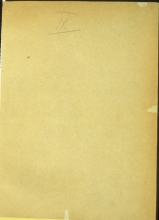



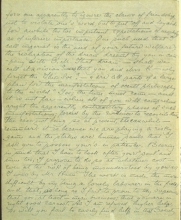

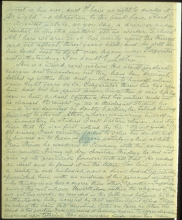

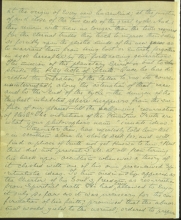
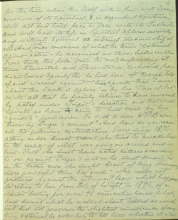

Number 61 penciled at right.